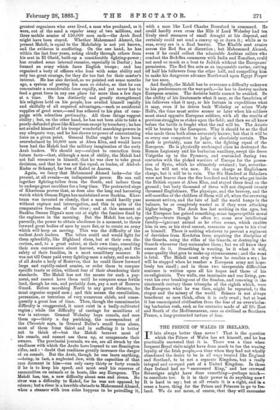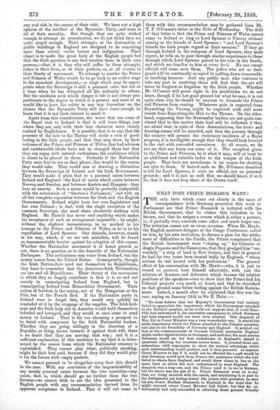THE PRINCE OF WALES IN IRELAND.
IS late always better than never ? That is the question which the Prince of Wales has set himself, and he has practically answered that it is. There was a time when frequent Royal visits might have done much to fan the waning loyalty of the Irish people,—a time when they had not wholly abandoned the desire to be in all ways treated like England and Scotland, to be not a separate Kingdom, but a really integral and co-equal part of a United Kingdom. In those days Ireland had no "uncrowned King," and her crowned Sovereigns might have done something—perhaps muck— to conciliate her. Is it in their power to do anything now; It is hard to say ; but at all events it is a right, and in a sense a brave, thing for the Prince and Princess to go to Ireland. We do not mean, of course, that they will encounter
any real risk in the course of their visit. We have not a high opinion of the intellect of the Dynamite Party, and none at all of their morality. But though they are quite wicked enough to attempt an assassination, we do not think they are quite stupid enough. Their attempts at the destruction of public buildings in England are designed to do something more than raerely excite horror and indignation. Their object is to make the great body of the English people feel that the Irish question is one that touches them in their own persons,—that it is they who will suffer by these attempts, either in their lives, or in their pockets, or, at all events, in their liberty of movement. To attempt to murder the Prince
and Princess of Wales would be to go back to an earlier stage in the anarchist development,—a stage which may be appro
priate when the Sovereign is still a personal ruler, but not at a time when he has delegated all his authority to others. But the vividness with which danger is felt is not always pro portionate to the degree in which it is present, and none of us would like to have his safety in any way dependent on the chance that the Dynamite Party will have sense enough to know that it is not their interest to assail it.
Apart from this consideration, the worst that can come of the Royal visit to Ireland is that it will leave things just where they are only with their true character more clearly realised by Englishmen. It is possible, that is to say, that the presence of the heir to the Throne will strike a vein of goodfeeling in the Irish people, and that they may show, by their welcome of the nince and Princess of Wales, that bad advisers and unattainable ideals have not so changed them but that they can repay with natural enthusiasm the confidence which is about to be placed in them. Probably if the Nationalist Party were free to act as they please, this would be the course they would take. They would aim at drawing a distinction between the Sovereign of Ireland and the Irish Government. They would make it plain that to a personal union between Ireland and England—the kind of union which exists between Norway and Sweden, and between Austria and Hungary—they bear no enmity. Such a union would be perfectly compatible with the restoration of "Grattan's Parliament," and with an all but complete separation between the Irish and the English Governments. Ireland might have her own Legislature and her own Cabinet ; in fact, with the single exception of the common Sovereign, she need share absolutely nothing with England. Mr. Parnell has never said anything which makes his acceptance of such an arrangement impossible ; he might, without the slightest inconsistency, be as marked in his homage to the Prince and Princess of Wales, as he is in his repudiation of Lord Spencer. One obstacle, however, stands
ii his way, which, if we are not mistaken, will be found an insurmountable barrier against his adoption of this course.
Whether the Nationalist movement is of home growth or not, there is no question as to the domicile of the Nationalist Exchequer. The enthusiasm may come from Ireland, but the money comes from the United States. Consequently, though the Irish Nationalists need not themselves be Republicans, they have to remember that the American-Irish Nationalists are one and all Republicans. Their theory of the movement to which they so largely contribute is that it is to end not merely in emancipating Ireland from England, but in emancipating Ireland from Monarchical Government. Their notion of freedom is the notion, not of the Hungarian or the Pole, but of the French Red. If the Nationalist party in Ireland were to forget this, they would very quickly be reminded of it by the stoppage of the supplies. The Irish hodman and the Irish help out in America would hold themselves befooled and betrayed, and they would at once cease to send money to Ireland. That is far too alarming a prospect to be faced with composure by the Irish Nationalist leaders. Whether they are going willingly in the direction of a Republic, or being drawn towards it against their will, there is no doubt that they are moving that way ; and it is a sufficient explanation of this tendency to say that it is determined by the source from which the Nationalist treasury is replenished. They cannot play what, politically speaking, might be their best card, because if they did they would play it for the future with empty pockets.
We cannot pretend to be altogether sorry that this should be the ease. With our conviction of the impracticability of any merely personal union between the two countries—any
union, that is, which should go no further than the two Crowns—,-we cannot wish to see the idea presented to the
English people with any recommendation derived from its apparent acceptance in Ireland. That it will not come to
them with this recommendation may be gathered from Mr. T. P. O'Connor's letter in the Echo of Wednesday. The drift of that letter is that the Prince and Princess of Wales cannot come to Ireland so long as Lord Spencer is Viceroy without coming as the friends of Lord Spencer ; "and Lord Spencer's friends the Irish people regard as their enemies." If they go through Ireland in the company of Lord Spencer, they must expect, he tells us, to pass through similar experiences to those through which Lord Spencer passed in his tour in the South, and which are familiar to him at every levee. No one except officials will come near them. The police who act as their guard will be continually occupied in pulling-down treasonable or insulting banners. And any public man who ventures to take any part in receiving them will find that the act will never be forgiven or forgotten by the Irish people. Whether Mr. O'Connor will prove right in his predictions we do not know, though if he has good ground for what he says, it is not quite clear why he should be anxious to dissuade the Prince and Princess from coming. Whatever gain is expected from Boycotting the Viceroy, might be expected with still more reason from Boycotting the Heir to the Throne. On the other hand, supposing that the Nationalist leaders are not quite convinced that in this matter their lead will be followed, if they are afraid that, in spite of their denunciations, the levies and drawing-rooms will be crowded, and that the journey through the country will present the customary incidents of a Royal progress, it is intelligible enough that they should look forward to the visit with concealed uneasiness. At all events, we do not see that any harm can come of it. The reception given to the Prince and Princess, be it what it may, will at least be an additional and valuable index to the temper of the Irish people. That facts are unwelcome is no reason for shutting our eyes to theni. If hatred such as Mr. O'Connor describes is felt for Lord Spencer, it rests on official, not on personal grounds ; and it is just as well that we should know, if so it be, that it does not stop short of the Crown itself.



































 Previous page
Previous page